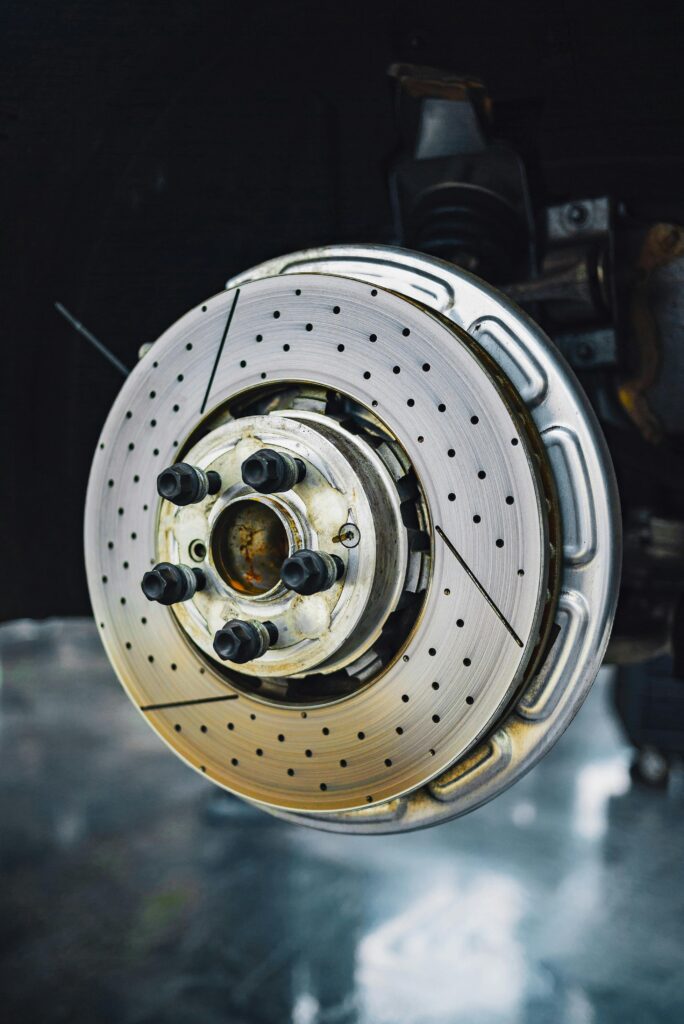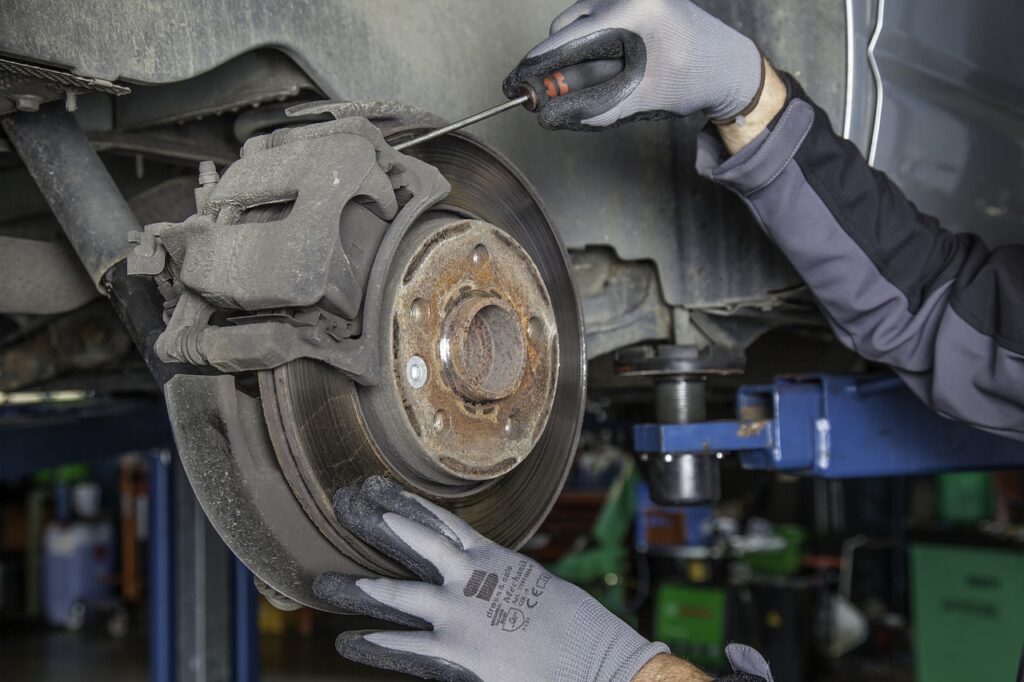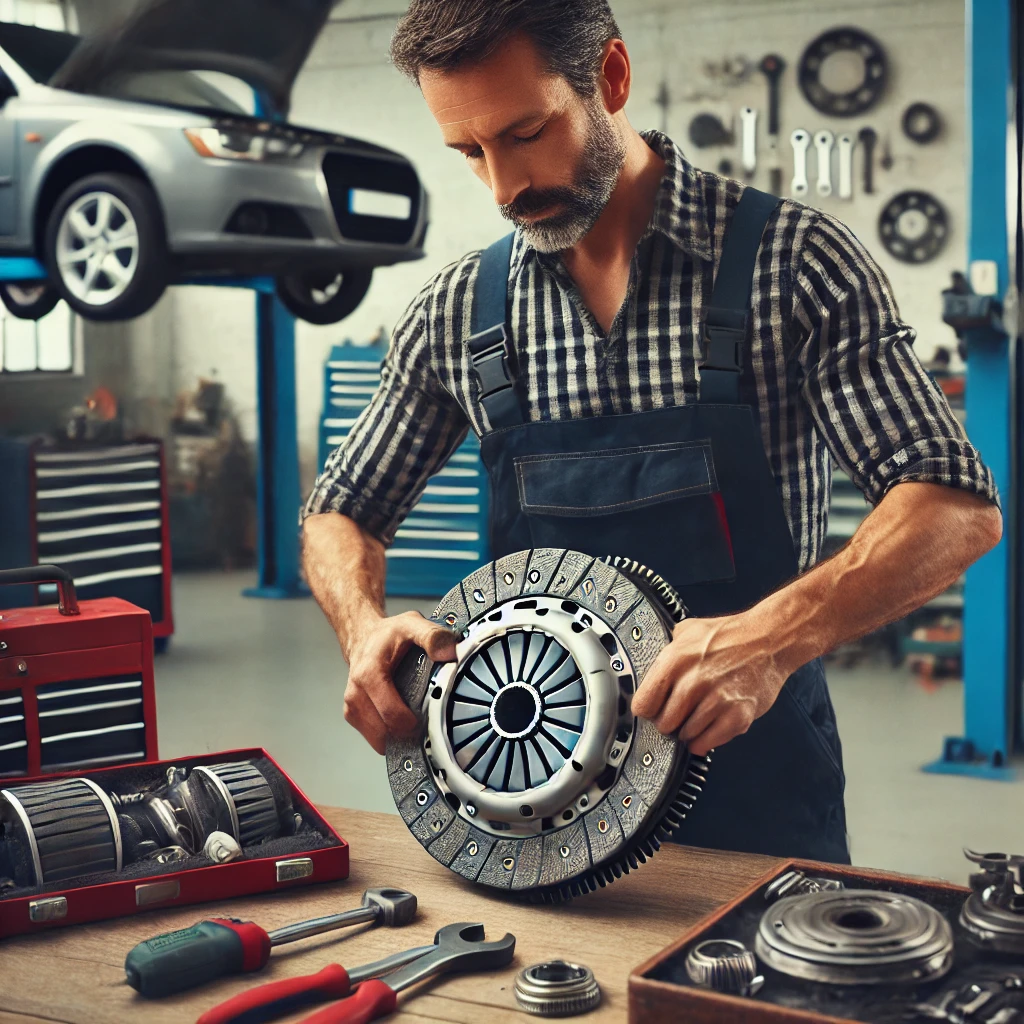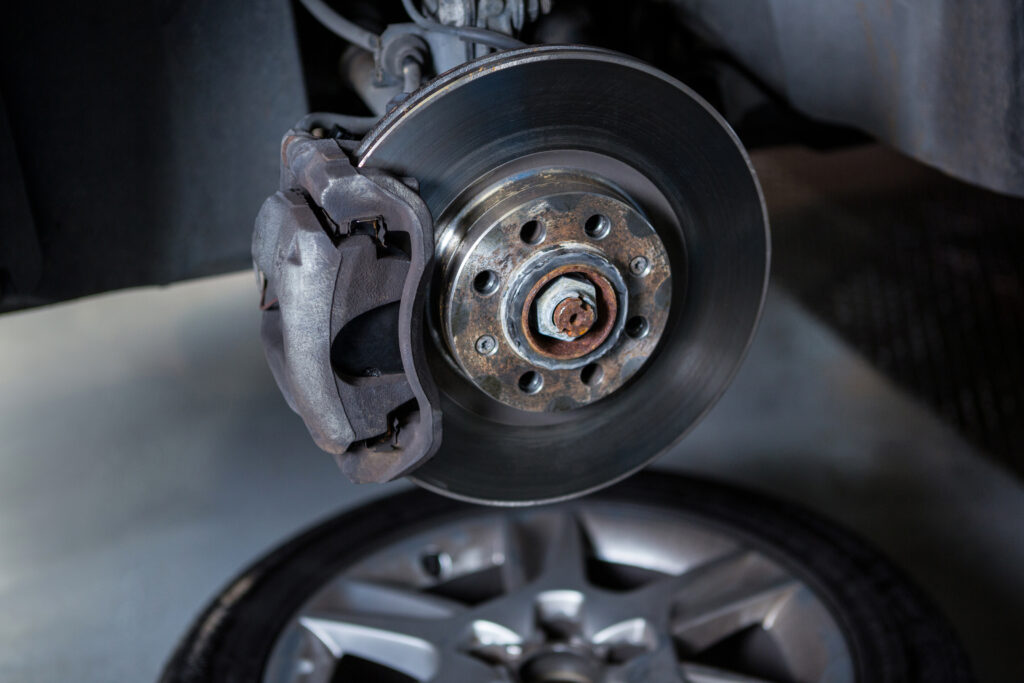
How Brake Pads Function?
Brake pads are a key component of your vehicle’s braking system, ensuring you can slow down or stop safely. You can think of them like the way your hand grips a lever to apply pressure. When you step on the brake pedal, it activates the braking mechanism.
Here’s how it works: pressing the brake pedal sends hydraulic fluid through the brake lines, generating pressure. This pressure forces the brake calliper to press the brake pads against the brake disc (or rotor). As the pads contact the rotating disc, they create friction, which slows down the wheels and eventually brings the car to a halt.
Brake pads are constructed from materials engineered to withstand high temperatures and resist wear, allowing them to perform reliably even during demanding driving conditions. However, with time and use, the friction material on the pads will wear down, necessitating replacement to ensure effective braking.
It’s important to routinely inspect and replace your brake pads as needed for your safety. If brake pads become too worn, they can lead to decreased braking power, longer stopping distances, and potential damage to the brake discs. Monitoring your brake pads is essential to guarantee that your vehicle stops securely when required.
Understanding the Brake Pad Replacement Process
Replacing brake pads is a critical maintenance task that ensures your vehicle’s braking system operates safely and efficiently. Here’s an in-depth look at the steps involved in this process:
The mechanic begins by lifting the car using a hydraulic lift or jack stands to provide easy access to the wheels, ensuring a safe working environment.
Using a lug wrench, the mechanic takes off the wheels to expose the brake components, including the brake calipers and rotors. Keeping the lug nuts organized is important for reassembly.
The mechanic loosens the bolts securing the calipers, which may require a ratchet and socket. Care is taken to support the caliper to avoid putting stress on the brake lines.
The worn brake pads are carefully removed from the calipers. The mechanic inspects the brake rotors for wear or damage, such as grooves or warping. If necessary, the rotors may be resurfaced or replaced, which involves additional steps like machining.
Before installing new pads, the mechanic cleans the caliper brackets and rotor surfaces with brake cleaner to eliminate dust and debris. This promotes optimal contact and helps reduce noise.
New brake pads that match the vehicle’s specifications are installed. The mechanic may apply brake lubricant to the backing of the pads to prevent squeaking and ensure smooth operation.


Identifying the Need for Brake Pad Repair or Replacement
Understanding when your brake pads require repair or replacement is essential for maintaining your vehicle’s safety. Here are several critical signs to watch for that may indicate a need for attention:
A common indicator that your brake pads are worn is a high-pitched squeal when you apply the brakes. Many modern brake pads are equipped with built-in wear indicators that create this noise as a warning that the pads need replacement soon.
If you hear a grinding sound while braking, this is often a sign that the brake pads have worn down completely, leading to metal-on-metal contact. This not only requires immediate replacement of the pads but can also damage the rotors, resulting in more costly repairs.
When the brake pedal feels soft or spongy, it can indicate a problem with the brake pads or the overall braking system. This sensation may result from air in the brake lines or worn-out pads, and it’s important to have it checked promptly.
The worn brake pads are carefully removed from the calipers. The mechanic inspects the brake rotors for wear or damage, such as grooves or warping. If necessary, the rotors may be resurfaced or replaced, which involves additional steps like machining.
If your car drifts to one side when you brake, this could signify uneven wear on the brake pads or issues with the brake calipers. Such a condition can affect your stopping power and should be investigated by a mechanic.
Find the Perfect Fit for Your Budget
Choose from our range of flexible pricing options that cater to your specific needs.
£121
Audi
£125
BMW
£110
Citroen
£109
Ford
£125
Land Rover
Frequently Asked Questions About Brake Discs
Brake pads are crucial components of a cars braking system. They generate friction against the brake rotor when you hit the brake pedal, helping to slow down or stop the vehicle. As they wear out over time, they must be replaced to maintain safe driving.
Lorem ipsum dolor sit amet, consectetur adipiscing elit, sed do eiusmod tempor incididunt ut labore et dolore magna aliqua. Ut enim ad minim veniam, quis nostrud exercitation ullamco laboris nisi ut aliquip ex ea commodo consequat.
Yes, you can change brake pads on your own if you have some basic tools and know how to do it. You’ll need to lift the car, take off the wheels, remove the old pads, and put in new ones. Just make sure to be safe and follow the steps carefully. If you’re not confident, it’s better to ask a mechanic for help.
Changing brake pads usually takes about 1 to 2 hours. If a mechanic is doing it, they can work faster, but if you’re doing it yourself and are new to the process, it might take a little longer. This time includes lifting the car, taking off the wheels, putting in new pads, and putting everything back together. If there are other problems with the brakes, it could take more time.
Brake pads should generally be replaced every 30,000 to 70,000 miles, but this can vary based on your driving habits and the type of vehicle you have. If you do a lot of stop-and-go driving or drive in hilly areas, you might need to replace them more often. It’s also a good idea to have them checked regularly during maintenance to ensure they’re still in good condition.
To extend the lifetime of your brake pads, consider adopting some simple driving habits and maintenance practices. First, try to drive smoothly by avoiding sudden stops and hard braking, as this reduces the wear on the pads. Keeping a safe distance from the car in front of you can also help; it gives you more time to brake gently instead of slamming on the brakes. Additionally, avoid overloading your vehicle, as carrying extra weight puts more pressure on the brakes. Regular maintenance is essential, so have your brakes inspected frequently and serviced if necessary to catch any issues early on. Lastly, using engine braking when going downhill can help slow down the car without relying solely on the brakes. By following these tips, you can help your brake pads last longer and ensure a safer driving experience.
You can tell if your brake pads need replacing by listening for squeaking or grinding noises when you brake, which indicates they may be worn down. Additionally, if you feel a vibration in the brake pedal or notice your car takes longer to stop, it’s a sign that the pads may need to be replaced. Checking the pads visually is also helpful; if they look thin through the wheel spokes, it’s time for new ones. If you notice any of these signs, it’s important to have your brakes inspected for safety.
No, driving with worn brake pads is unsafe and can lead to accidents because they are less effective at stopping your vehicle. You might experience longer stopping distances and hear grinding noises if they’re severely worn. It’s crucial to have them replaced as soon as possible to ensure your safety on the road.
Yes, you can replace just the front brake pads if they are worn out while the rear pads are still in good condition. However, it’s generally a good idea to replace all the brake pads at the same time to maintain balanced braking performance and ensure safety. If only one set is replaced, it can cause uneven wear and affect the vehicles handling. Always consult with a mechanic for the best approach based on your vehicles condition.
Brake pads should typically be replaced when they have about 20% or less of their material remaining. This means that if your mechanic or brake technician measures the thickness of the pads and finds they are down to 2-3 millimeters, it is time for a replacement. Regular inspections can help you keep track of the wear and ensure safe braking performance. Always consult your vehicles manual or a professional mechanic for specific recommendations.
To figure out which brake pads need replacing, start by listening for unusual sounds like squeaking or grinding when you brake; these noises often mean the pads are worn. You can also look at the pads through the wheel spokes; if they look really thin, they need to be changed. If your car pulls to one side when you stop, that might indicate that one set of pads is more worn out than the other. Finally, if you notice a longer stopping distance or the brakes feel less effective, it’s a good idea to have a mechanic check them.
Replacing brake pads usually takes about 1 to 2 hours. If a mechanic does it, they might finish faster, but if you are doing it yourself and are new, it could take a bit longer. The process includes lifting the car, taking off the wheels, and putting in new pads.
No, you do not always need to replace the rotors when you change the brake pads. Rotors should only be changed if they are too thin, damaged, or worn out. A quick check during the pad change will help you know if they need replacing.
Car brakes usually last between 25,000 and 65,000 miles, depending on driving habits, road conditions, and the type of brake pads. Some can last even longer with careful driving and regular maintenance. It is always a good idea to check them regularly for wear.
Yes, worn brake pads can lead to an MOT failure if they are below the legal thickness or show signs of significant wear.
Replacing brake pads generally takes between 30 minutes to an hour per axle, depending on the car model and the mechanics expertise. Factors like rusted parts or specialized brake systems can increase the time. If both front and rear pads are being replaced, the total job might take 1 to 2 hours.
Brake disc blogs
Squeaky Brakes in Birmingham’s Rush Hour? Here’s What to Do
Squeaky brakes during Birmingham’s rush hour traffic aren’t just annoying—they could be a sign of…
Brake Repair Birmingham: What Every Driver Should Know
Need brake repair Birmingham? Discover costs, signs of trouble, and how to find reliable service…
Step-by-Step Guide to Replacing Brake Discs: A Complete DIY Tutorial
Introduction Replacing brake discs yourself is a practical DIY task that saves money and boosts…



